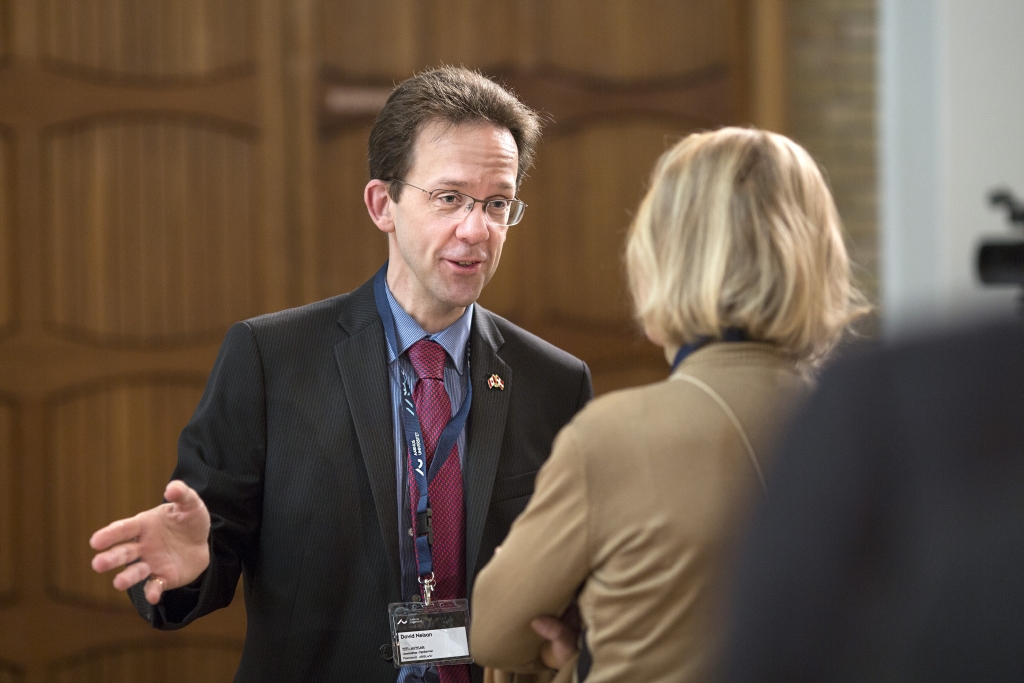Aarhus BSS to offer unique education for interpreters
Aarhus BSS has received the preliminary green light to set up a new, unique degree programme for conference interpreters. The one-year programme aims to turn the participants into specialists in their fields, capable of providing simultaneous interpretation at EU talks and in other international settings.
Update: 19-12-2017
Please note the programme has been moved to the faculty of Arts and is named: Master's Degree in Conference Interpretation
The programme, at the Department of Business Communication, will be the only one to offer this kind of training in all of Denmark. No Danish conference interpreters have graduated since Copenhagen Business School decided to terminate a similar programme in 2010.
The new programme will be introduced at a time when the demand for qualified Danish interpreters at the EU is set to explode. The ones who started work in the early 1970s at the time of Denmark’s entry into the European Community are about to retire. There is a severe need for replacements.
Shortage of interpreters
The fact that this need is now being met is significant in several different ways, according to Helle Vrønning Dam, professor in interpreting and translation at the Department of Business Communication and the future director of studies for the new programme.
”Already at this stage there is a shortage of Danish interpreters, especially at the European Parliament, meaning that some meetings have to go ahead without giving Danish MEPs the option of listening, speaking and negotiating using their mother tongue. This places them at a disadvantage compared with MEPs from countries where interpreting is offered,” said Dam.
”The availability of capable interpreters is a precondition for allowing Danes to participate on an equal footing with other nationals in, among other things, the EU system. It ensures their participation in the democratic procedures of the EU and guarantees the EU principle of multilingualism is maintained.”
She added that the presence of Danish interpreters is a prerequisite for maintaining the standing of the Danish language within the EU, saving it from being overwhelmed by larger and more dominant languages.
First class in 2017/18
The new one-year programme is special because it covers a tiny niche of specialists. The number of conference interpreters is small, whether in Denmark or globally. Nevertheless, it is important that the demand for conference interpreters is covered, according to Dam.
Aarhus BSS expects the first class, of about 25 students, to begin training in either 2017 or 2018. It is one of just four new degree programmes recently approved by the Danish minister of higher education and science – and it’s the only one among the four which is a university programme.
This speaks volumes about how the new programme is prioritised. The same is true of the fact that it will receive the highest level of educational grants from public coffers, which is extremely rare as far as degree programmes within the social sciences and humanities are concerned.
Highly specialised
The new programme in Aarhus is highly specialised and requires of the applicants that they have a Master’s degree and a high level of proficiency in Danish and at least two other languages. Apart from that, there are no real limits to the educational backgrounds that the successful candidates may have, reflecting the fact that the planned programme focuses less on learning languages and more on acquiring the skills of a professional interpreter.
”We expect the students to have very diversified histories. I’m sure there’ll be graduates specialising in languages, but I wouldn’t be surprised if we also find graduates from, say, law and economics,” said Dam.
Entry into the new programme is based on a rigorous test in which the applicants will have to prove that they are competent users of the Danish language, mastering all its subtleties, while also showing an active knowledge of at least one foreign language – i.e. being able to express themselves fluently and without difficulty – while showing passive knowledge of another – i.e. understanding the spoken language in all its different shades of meaning.
Good knowledge of international affairs
At the entrance test, the applicants also must demonstrate a special capacity for interpreting in addition to a good overall level of knowledge of international affairs and understanding of economic, social and cultural conditions in the countries where the languages they have chosen are spoken.
”Simultaneous interpretation, which is the kind of interpretation offered most often at international conferences, is a very demanding and challenging job,” said Dam.
”Apart from having excellent languages skills you also need to be a quick thinker and be able to focus. And then you need to understand what the discussion is about. That’s why it’s so crucial to know something about the specific economic, social and cultural conditions of the individual countries and also about international affairs.”
Further information
Helle Vrønning Dam
Professor in interpreting and translation
Department of Business Communication, Aarhus BSS
E-mail: hd@bcom.au.dk
Phone: +45 8716 4852
